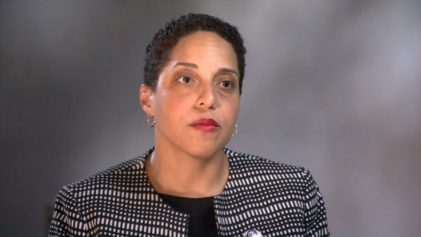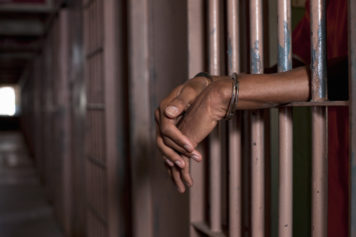
Over the past 15 years, pretrial detention has fueled 99 percent of all jail growth in the United States. Money is the key factor in pretrial detention, as 90 percent of people who remain in jail are unable to afford bail. The continued incarceration of these pretrial detainees costs the taxpayer an estimated $14 billion annually, with collateral costs upwards of $140 billion. (Photo: Eastern State Penitentiary. Source: Wikimedia Commons)
The socioeconomic inequality and racial injustices of American society are evident in that great processing plant of Black, Brown and poor bodies known as the criminal justice system. One of the key drivers of mass incarceration in the United States is cash bail, which keeps people who have not been convicted of a crime languishing in jail.
The issue of unaffordable bail was reinforced in 2015 when Kalief Browder, 22, committed suicide after being imprisoned on New York’s infamous Rikers Island city jail for three years for allegedly stealing a backpack. He was arrested in 2010 at the age of 16, and jailed because his family was unable to pay the $3,000 bail. Prosecutors dropped the charges after three years, during which time Browder had faced abuse from prison guards and inmates alike. He was released a broken young man, and he subsequently hanged himself.
In contrast to Browder, an affluent white teen, Cameron Terrell, 18, was arrested recently and charged with murder in an alleged gang shooting in South Los Angeles. Bail was set at $5 million for Terrell, a student at Palos Verdes High School who goes by the nickname “White Boy.” After they paid his bail and had him released, Terrell’s family arranged for off-campus study with the school after other parents complained that he was allowed to attend classes while out on bond for a murder charge.
Over the past 15 years, pretrial detention has fueled 99 percent of all jail growth in the United States. On a given day, nearly half a million people are in jail awaiting trial, or over 60 percent of inmates in jail. Most of the 12 million people booked every year are low-risk and in jail for low-level charges. Money is the key factor in pretrial detention, as 90 percent of people who remain in jail are unable to afford bail. In New York City, more than 90 percent of those who remain behind bars will plead guilty so they can go home. The continued incarceration of these pretrial detainees for days, weeks, months or even years costs the taxpayers an estimated $14 billion annually, with collateral costs upwards of $140 billion.
What was intended as a measure to ensure the accused return for trial has become prohibitively expensive. Money bail has a disproportionate impact on African-Americans, Latinos and Native Americans, who are detained at higher rates than whites, and twice as likely to languish in jail because the bail is too expensive. Pretrial detention has its consequences, making it more likely a person will be convicted and for a longer sentence. While in jail they lose their jobs, housing, medical care and even custody of their children, who become disrupted and traumatized by having a parent behind bars. Further, according to The Bail Project, 41 percent of sexual victimizations occur in the first three days of detention, while nearly half of all jail deaths take place within the first week. Some have even suggested that bail is unconstitutional when it hinges on one’s ability to pay more than factors such as whether the individual is a flight risk or a danger to society.
“There is no other place in the criminal legal system where money more clearly buys justice than bail. And make no mistake about it, communities of color, low-income communities and women bear the disproportionate impact of this profound injustice,” said Robin Steinberg, founder and CEO of The Bail Project, in a statement provided to Atlanta Black Star. Women are particularly vulnerable, given the dramatic 14-fold increase in the number of women in jails since 1970. Sixty percent have not been convicted of a crime, and one quarter have no trial set. Nearly 80 percent of them are mothers, and Black women are 44 percent of the U.S. female jail population.
Further, many women cannot make cash bail, as the median income of women who cannot afford bail is $11,071, $9,083 for Black women. The 2015 death of Sandra Bland, who died in a Texas jail cell unable to afford the $515 bail, highlights the problems of women housed in jail, who are more likely to face mental health challenges and psychological distress than women in prisons or incarcerated men in jail or prison. “Our project’s mission is to reduce the unacceptable human suffering caused by unaffordable cash bail, and build on ongoing community efforts to end the coercive and discriminatory impact of these systemic abuses.”
The Bail Project is taking steps to stem the tide of the modern day poor houses. An outgrowth of The Bronx Freedom Fund —which pays bail for clients of the community-based public defense office known as The Bronx Defenders and has helped thousands of people over a decade — this new organization is working in dozens of jurisdictions in the next five years to pay for cash bail for people in need, and fight for reforms in the system. The Project’s model takes advantage of the reality that bail money is returned once the case is resolved, assuming the person appears in court. In a single year, a dollar can be used in two or three bail payments, as data from the project’s pilot program in the Bronx has revealed.
Beginning with $16 million in seed money, the project has the potential to pay between $90 million to $105 million over the first five years. Because private funders cover the organization’s expenses, 100 percent of individual donations will cover bail. Each of 40 sites selected for the project will have a two-person team of Bail Disrupters — people from the community who will work with public defenders and grassroots groups create support systems and bail out those in need.
“What we know is that the criminal justice system criminalizes race and poverty — it has since its inception. That is readily apparent in the bail process, where a price tag is put on the presumption of innocence to which we are all entitled,” said Vincent Southerland, executive director of the Center on Race, Inequality and the Law at NYU Law School, and a founding board member of The Bail Project. “Far too often, the price of freedom is far out of reach for women and men of color and low-income communities. That’s a fundamental unfairness that The Bail Project addresses.”
With a goal of bailing out 160,000 people, whose individual nightly detention cost is $85, per conservative estimates, there is a potential to save hundreds of millions of dollars in taxpayer revenue and help the accused and their families. Moreover, data from the project has shown 95 percent of people return to court for every appearance, and a majority of those who are bailed out through philanthropy have their cases dismissed, while the nearly half of the remaining cases result in non-criminal dispositions. According to the National Bail Fund Network, there are about 25 funds nationwide.
These efforts such as The Bail Fund know they have fulfilled their mission when they are no longer in need, and they can close shop because they have resolved the problem and helped enact reforms across the country. Efforts such as legislation introduced by Sen. Kamala Harris (D-CA) to encourage states to end money bail and replace it with the risk-based pretrial release are encouraging. In the meantime, bail abuse is a severe punishment for those who cannot afford justice and have yet to have their day in court. This new effort to turn things around on a national scale is timely and deserves our attention.


